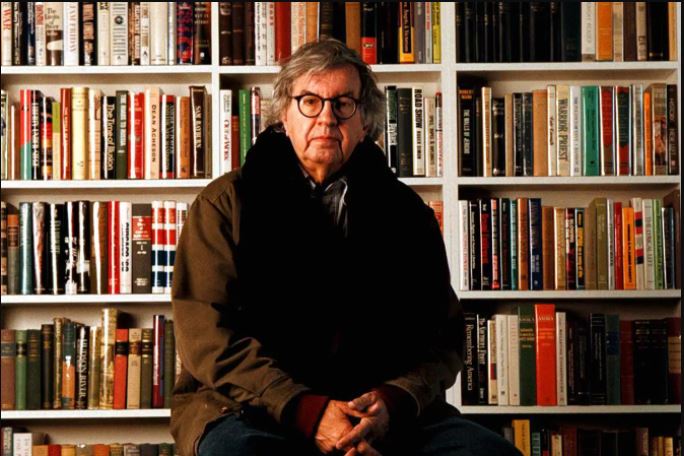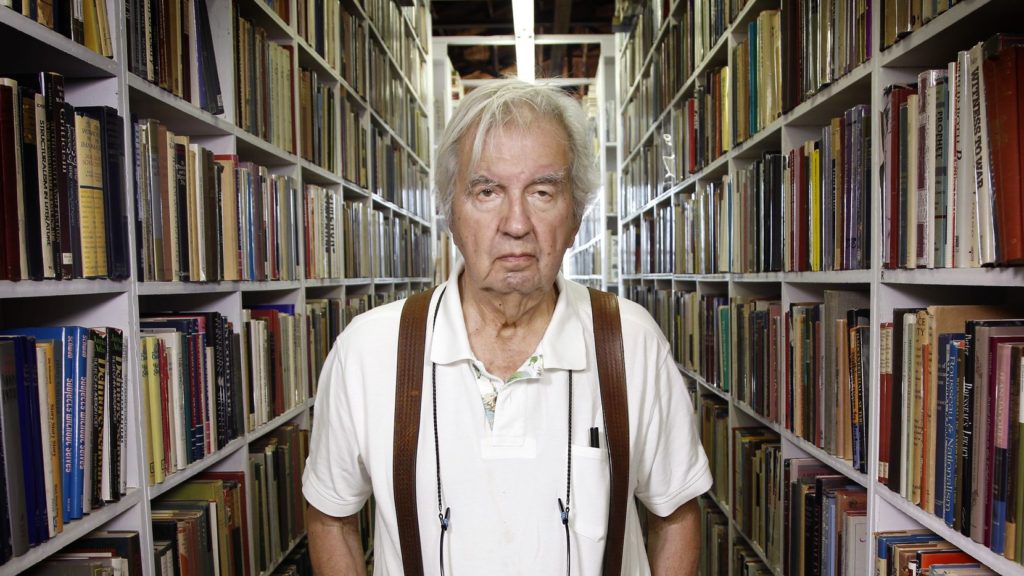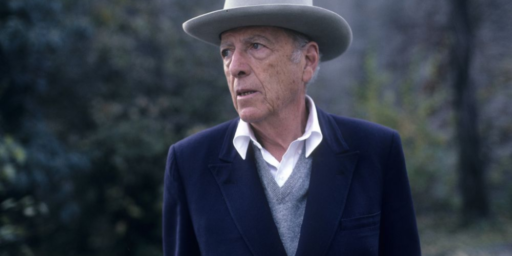Larry McMurtry, 1936-2021
The author of "Lonesome Dove," "Terms of Endearment," and so many more great novels is gone at 84.

NYT (“Larry McMurtry, Novelist of the American West, Dies at 84“):
Larry McMurtry, a prolific novelist and screenwriter who demythologized the American West with his unromantic depictions of life on the 19th-century frontier and in contemporary small-town Texas, died on Thursday at home in Archer City, Texas. He was 84.
The cause was congestive heart failure, said Diana Ossana, his friend and writing partner.
Over more than five decades, Mr. McMurtry wrote more than 30 novels and many books of essays, memoir and history. He also wrote more than 30 screenplays, including the one for “Brokeback Mountain” (written with Ms. Ossana, based on a short story by Annie Proulx), for which he won an Academy Award in 2006.
But he found his greatest commercial and critical success with “Lonesome Dove,” a sweeping 843-page novel about two retired Texas Rangers who drive a herd of stolen cattle from the Rio Grande to Montana in the 1870s. The book won a Pulitzer Prize in 1986 and was made into a popular television mini-series.
Mr. McMurtry wrote “Lonesome Dove” as an anti-western, a rebuke of sorts to the romantic notions of dime-store novels and an exorcism of the false ghosts in the work of writers like Louis L’Amour. “I’m a critic of the myth of the cowboy,” he told an interviewer in 1988. “I don’t feel that it’s a myth that pertains, and since it’s a part of my heritage I feel it’s a legitimate task to criticize it.”
But readers warmed to the vivid characters in “Lonesome Dove.” Mr. McMurtry himself ultimately likened it, in terms of its sweep, to a Western “Gone With the Wind.”
WaPo (“Larry McMurtry, award-winning novelist who pierced myths of his native Texas, dies at 84“):
Larry McMurtry, a Texas-born, Pulitzer Prize-winning novelist and Oscar-winning screenwriter who pierced the myth of the Lone Star State’s romanticized past in works such as “Lonesome Dove” and “The Last Picture Show,” died March 25 at his home in Tucson. He was 84.
[…]
In a prodigious career spanning six decades, Mr. McMurtry wrote more than 30 novels, scripts for nearly as many movies and television series, three memoirs, countless book reviews and essays, and biographies of Western characters including Crazy Horse, George Custer and Buffalo Bill.
His best-known work remains “Lonesome Dove,” an epic novel about cowboys and cattle drives, grizzled Texas Rangers, frontier prostitutes, dexterous gamblers, odoriferous buffalo hunters and other roisterous denizens of the American West. The book sold more than 1 million copies, received the 1986 Pulitzer Prize for fiction and became a popular CBS miniseries starring Tommy Lee Jones and Robert Duvall.
“Some claim the three essential books in Texas history are the Bible, the Warren Commission report and Larry McMurtry’s ‘Lonesome Dove,’ ” historian Douglas Brinkley wrote in a 2017 New York Times essay.
Ironically, “Lonesome Dove” appeared just a few years after Mr. McMurtry wrote a long essay for the Texas Observer in which he gigged his fellow Texas writers for their unseemly swoon over cowboys and for their lingering attachment to a rural Texas yesteryear. Relishing the role of curmudgeon, he observed that the open range had sprouted sprawling suburbia, that old barns and rustic windmills had given way to sleek glass towers thrusting skyward in several of the nation’s largest cities.
“Easier to write about the homefolks, the old folks, cowboys, or the small town,” he chided, “than to deal with the more immediate and frequently less simplistic experience of city life.” His own acclaimed trilogy of Houston novels — “Moving On” (1970), “All My Friends Are Going to Be Strangers” (1972) and “Terms of Endearment” (1975) — plumbed the textured richness, brio and occasional craziness of one of America’s fastest-growing metropolitan areas.
[…]
Mr. McMurtry, a onetime co-owner of a bookstore in Washington’s Georgetown neighborhood, also was an obsessive collector of antiquarian books. In the late 1980s, he left the shop, Booked Up, bought a string of abandoned buildings in the moldering Texas town where he was raised, and stocked them with his personal collection, books from the Georgetown store and private collections he continued to buy — some 450,000 in all.
His intention, he said, was to turn Archer City — “a bookless town in a bookless part of the state” — into a Lone Star version of Hay-on-Wye, the celebrated bookstore and book-festival town in Wales.
NPR (“Larry McMurtry, Novelist And Screenwriter Of The West, Has Died At Age 84“):
Larry McMurtry, a prolific, Pulitzer Prize-winning author and Oscar-winning screenwriter, has died at age 84. He was beloved for riveting and yet unsentimental depictions of the American West in books such as Lonesome Dove as well as for tales of family drama including Terms of Endearment.
[…]
McMurtry served as the president of PEN America‘s Board of Trustees for two years, beginning in 1989. That year, he testified before Congress to oppose provisions of federal immigration laws that had allowed the U.S. to exclude writers and others on ideological grounds; some of those provisions were repealed. In addition, he defended fellow author Salman Rushdie after Iran’s Ayatollah Khomeini issued a death threat against Rushdie after the publication of The Satanic Verses.
[…]
Born in 1936 on a Texas ranch, McMurtry came to his love of the West through his family. His grandfather broke horses, and his father raised cattle.
“The West is mostly a very beautiful place,” he told NPR’s All Things Considered in 2014. “There are all those lovely spaces. There are all those running horses. It’s a poetic imagery and it’s been there for a long time.”
But he wanted to scour that landscape of sentimental nostalgia for cowboys, he added. “To me it was hollow and I think it was hollow for my father, although he might not have ever brought that to his conscious mind. He totally loved cowboys and so did most of the cowboys we worked with and that got him through his life. But he knew perfectly well, so did we, that it wouldn’t last another generation, it just was not going to last.”

Dallas Morning News (“Texas literary giant Larry McMurtry dies at 84“):
Larry McMurtry, a Pulitzer Prize-winning author and Oscar-winning screenwriter, whose novels about small-town life and the cowboy era of the American West chiseled him into the folklore of his native Texas, died Thursday night. He was 84.
McMurtry shaped Texas’ view of itself far more than any contemporary writer. None achieved his level of critical acclaim or rivaled his Hollywood success, as he simultaneously shattered and celebrated the mythology of his native state.
The son of a West Texas rancher, he wrote his debut novel at 25. Horseman, Pass By became the Oscar-winning movie Hud, starring Paul Newman. McMurtry wrote 46 books, including the novels The Last Picture Show and Terms of Endearment, which became Oscar-winning movies, as did Brokeback Mountain, for which McMurtry and Diana Ossana won an Oscar for best adapted screenplay.
[…]
Despite his success, McMurtry was fond of saying that he was nothing more than “a minor regional novelist.” For years, he wore a T-shirt that proudly proclaimed the description he gave himself. Philip Roth was a great American novelist, he once told a crowd in Dallas, insisting in the same breath that he was not.
He had a reputation for being cantankerous, but flash to his childhood, and McMurtry’s mood could change from cynicism to sentimentality in an instant, especially when he shared the story of what turned him on to reading.
With uncharacteristic emotion, he said during an appearance at the Nasher Sculpture Center in 2008 that his life changed forever the day his 19-year-old uncle, home from the Korean War, showed up in Archer City and gifted his nephew his prized collection of children’s literature.
“That,” McMurtry said during the Nasher Salon Lecture Series, “was a defining moment in my life.”
Books became a tool of survival for a budding intellectual who once called his hometown “the bookless part of a bookless state.” In later years, the town became the headquarters of McMurtry’s internationally renowned book collection, which at one time occupied multiple storefronts on the barren streets and numbered close to half a million titles.
“The neighbors aren’t crazy about those books,” he said. “But there’s not much I can do about it. They’re passive — they’re not attacking anybody. And yet, the neighbors feel a certain threat.”
Texas Monthly had an interesting feature by Skip Hollandsworth in July 2016 (“The Minor Regional Novelist“) celebrating his 80th birthday. After a meandering description of the author’s unusual and modest lifestyle, it observes:
In American letters, he is something of an icon—winner of both a Pulitzer Prize (for the novel Lonesome Dove, about a cattle drive in the 1870s) and an Oscar (for the screenplay to Brokeback Mountain, which he co-wrote with Ossana, about two sexually conflicted modern-day cowboys). His storytelling has been compared to that of Charles Dickens and William Faulkner, and even the famously self-absorbed novelist Norman Mailer—himself a winner of two Pulitzers—once confessed his admiration. “He’s too good,” he said, explaining his resistance to McMurtry’s novels. “If I start reading him, I start writing like him.”
Nowhere is that writing as fiercely cherished or as deeply felt as in Texas, the setting for the majority of his work, and which McMurtry has by turns elevated and eviscerated with the kind of marrow-piercing observations only ever allowed native sons. His fans in Texas—and they are legion—treat him with the adulation typically reserved for movie stars. In 2014, when he appeared at the Dallas Museum of Art to promote his latest best-seller, a western titled The Last Kind Words Saloon, the 425-seat auditorium was filled to capacity, and dozens more ticket holders were ushered into overflow rooms to watch on simulcast. During a question-and-answer segment, audience members took turns commandeering the microphone to tell McMurtry what his books had meant to them. One woman spoke of her love of The Last Picture Show, his novel about teenagers coming of age in the fictional North Texas town of Thalia; another brought up Terms of Endearment, his novel about an indomitable grande dame in Houston’s wealthy River Oaks neighborhood. A man confessed that he had read the 843-page Lonesome Dove three times. And then another man rose to recall, in almost reverential tones, how as a student at Texas Christian University in the early sixties, he had played a game of Ping-Pong against McMurtry, who was then teaching at the school. The man had lost.
“Yes, I was quite good at Ping-Pong,” McMurtry replied, and the audience roared with laughter, as if it was the funniest thing anyone had ever heard.
While I’m sure I’d seen “Terms of Endearment,” I became aware that McMurtry existed when the “Lonesome Dove” miniseries aired in February of 1989. I was in the midst of the Field Artillery Basic Course at Fort Sill, Oklahoma and everyone in my circle watched it. I’ve gone back to it multiple times, including its lesser-but-still-decent sequels. And I read several of his novels, including “Lonesome Dove” and “Buffalo Girls.”
Typically when someone dies at the ripe old age of 84, they’re long past their productive prime.
His first book, published when he was 25, was a bestseller and turned into a movie. His most recent movie, “Good Joe Bell,” was released just last year.





The de-mythologizing of Texas which reached its peak in Lonesome Dove can be seen earlier in Horseman, Pass By (“Hud” on the silver screen, 1963) and The Last Picture Show.
Through the 80’s and early 90’s, I probably read everything that McMurtry had written to that point. Browsing the library shelves, I picked up Cadillac Jack, I was unfamiliar with McMurtry but the book looked interesting and I was hooked. A wonderful story teller.
RIP
The first book of his I read was The Last Picture Show back when I was still in HS. Over the years I’ve read a few more but somehow or other never got around to Lonesome Dove. Maybe that should be the next book I read.
A few years ago, friends of ours asked if we wanted to go see a singer/songwriter named James McMurtry. The name rang a bell for me, but I couldn’t really put my finger on why…until I looked it up. James is Larry’s son, and I started babbling about how famous his dad was.
I’ve never read Lonesome Dove, but am thinking that might now be on my summer reading list. Someone here also recommended Cadillac Jack (might have been Sleeping Dog! 🙂 ) and that’s now on my TBR list as well.
Michael Korda, McMurtry’s editor at Simon and Schuster, called him “the Flaubert of the Plains.”
The mythology of the West. About 20 years ago at University of Colorado Boulder there was a push out of one of the “studies” programs for a museum of womxn in the West (Intermountain) – until they realized that the women were plural Mormon wives, hookers, or native wives of Whites (the Metis people are really interesting https://en.wikipedia.org/wiki/M%C3%A9tis#M%C3%A9tis_people_in_Canada). Another myth is the “natives” were all living in harmony, when instead they were raiding and taking slaves (but it was a different type of slavery, not). There are still ancestral hatreds between tribes (like the Lakota Sioux, and the Haida and Tlinkit – other tribes shun their members today). I’m not “blood” (legal term) but half of my cousins are so I follow this stuff (zero are reservation Indians, though one cousin’s daughter works for a small California tribe running their nutrition program, native hiring preference = legally allowed bigotry (I agree with it)).